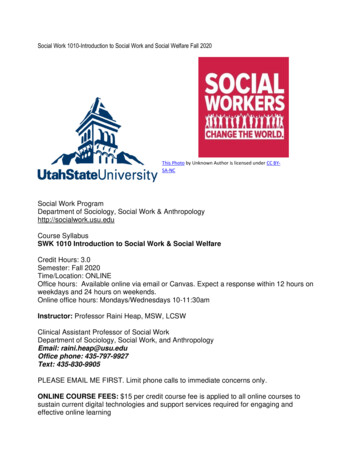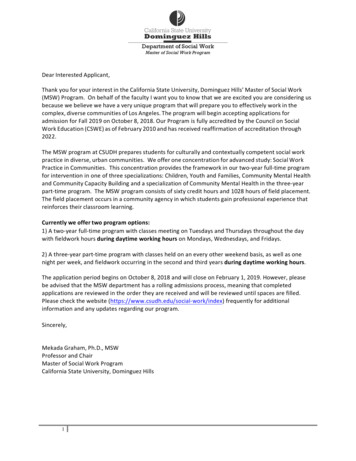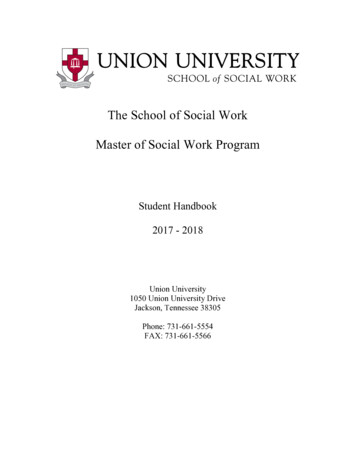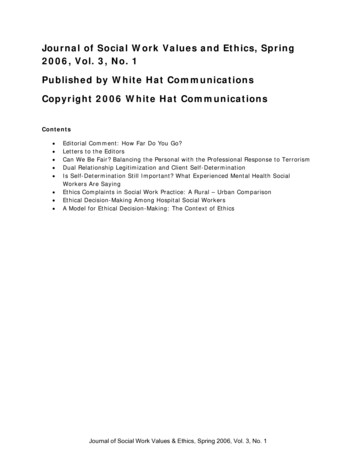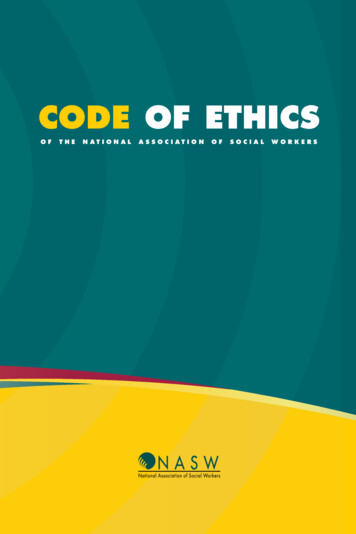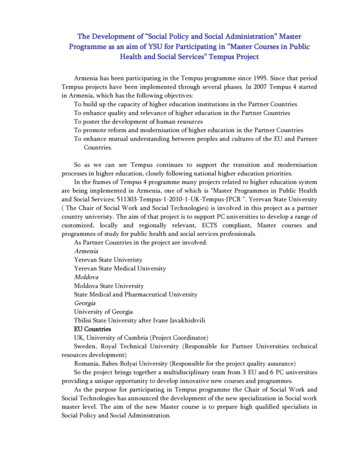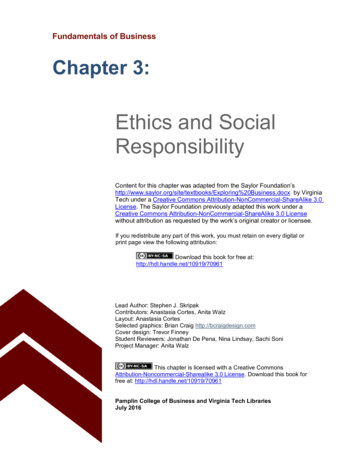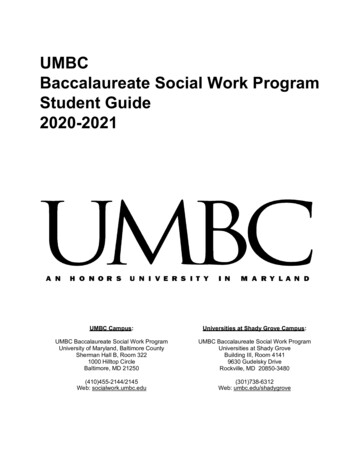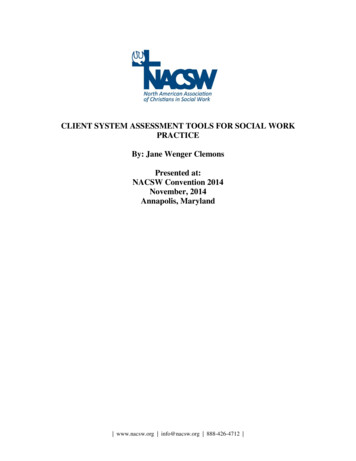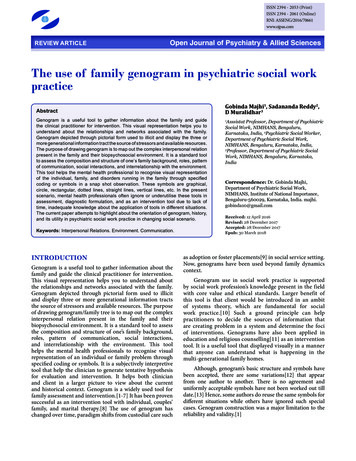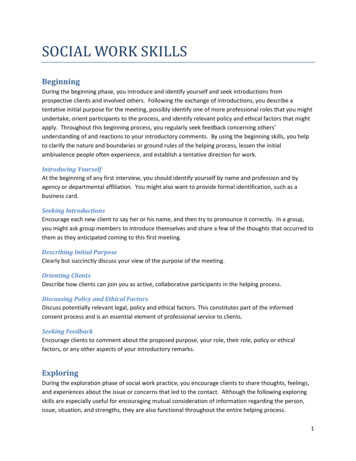
Transcription
Guide toSocial Work EthicsCourse DevelopmentContents:Introduction . 2Course goals . 4Core Content . 5Applicable Areas of Practice . 5Objectives . 6Suggested Teaching Methods and Resource Materials . 9Instructor qualifications .10Glossary .10Resources .14Acknowledgments .16
IntroductionThe Association of Social Work Boards (ASWB) Guide to Social Work EthicsCourse Development is the first attempt by a national organization of social workregulatory boards to develop a set of guidelines for the content of social work ethicscourses, workshops and seminars. This guide is the result of two years of work bymembers of the ASWB Approved Continuing Education (ACE) Committee, guided byinput solicited from social work regulatory boards, social work practitioners, and socialwork educators.The purpose of this resource is to provide a social work ethics course structure forcontinuing education (CE) providers that is informed by the perspective of social workregulators. The Guide to Social Work Ethics Course Development establishes standardsfor common course goals and objectives and core content as well as acceptable teachingmethods, resource materials, and instructor qualifications. The Association of SocialWork Boards believes that social work boards can better protect the public when theyhave access to resources, such as the Guide to Social Work Ethics Course Development,that reflect the most current thinking on issues relevant to professional regulation anddiscipline.Over the past few years an increasing number of social work regulatory bodieshave begun requiring specific continuing education in social work ethics for licensurerenewal. In some ways, this trend has created a new set of challenges for continuingeducation providers, regulatory boards, and social workers: providers are eager toprovide social work ethics CE but unsure of board expectations, boards are clear aboutthe need for ethics CE but unsure of how directive they should be as to actual coursecontent and delivery, and social workers are willing to comply with the requirements butunsure of whether the courses they take will satisfy board requirements and providerelevant CE on social work ethics.One of the most important goals of the Guide to Social Work Ethics CourseDevelopment is to facilitate greater standardization of ethics courses among jurisdictionsboth nationally and internationally. Use of this guide will make it possible for boards todevelop common course goals and objectives while allowing jurisdictions to modifycontent to reflect the practice of social work in their particular area. Providers—many ofwhich deliver CE in multiple jurisdictions, or over the internet—will have access to morestandardized information on appropriate content and delivery methods. Finally, throughthe ASWB Approved Continuing Education program, social workers will be able toaswb guide to social work ethics course development2
connect with providers whose courses meet certain standards for social work ethicscontent.Development of the manualMembers of the ACE Committee who drafted the social work ethics course guidereflected diversity among the profession and the regulatory community. Three membershad faculty positions in a school of social work teaching a range of students from thebaccalaureate to doctoral level, one member was a clinical social worker working in acommunity mental health agency in a rural community, two were in full or part timeprivate practice, and one member was a doctoral student specializing in indirect practice.The committee met four times in person over two years and numerous times byteleconference in addition to attending to ongoing ACE program work. The ACECommittee considered several domains of social work professional ethics related tocontinuing education, and examined connections to the licensure and renewal processesand discipline. Data were collected from a range of sources beginning with a survey ofboards. Published materials focusing on practice competence, malpractice, riskmanagement, and the social work profession’s evolution in the field of ethics werereviewed. Data from educational sources, both colleges and universities, and continuingeducation materials were investigated. The committee queried the National Associationof Social Workers (NASW) Insurance Trust and the ASWB Disciplinary ActionReporting System (DARS) report. A complete listing of bibliographic resources used canbe found in Appendix A.Input was solicited from professionals with expertise in ethics during thedevelopment of earlier drafts of the model course guide. In the May 2003 SpringMeeting in Buffalo, NY, the final draft of the Guide to Social Work Ethics CourseDevelopment was distributed to all participants for comments. Finally, the ACE ProgramCommittee members met in July 2003 to make any final changes to the model courseoutline and decided upon plans to present the ASWB Guide to Social Work Ethics CourseDevelopment to the ASWB Board of Directors. The Board of Directors approved thedissemination of this guide as an association resource document in November 2003.Basic frameworkThe guide establishes three levels of course work; basic, intermediate, andadvanced as well as an emphasis on either direct or indirect practice. Common coursegoals and objectives are established and course content is identified. Course goals covera range of topics from understanding the history of social work ethics to critical thinkingskills. Course content reflecting these goals and objectives includes the history andevolution of values and ethics in social work, ethics theories, professional standards ofpractice, legal requirements, self-awareness about ethical professional behavior, and anexamination of ethical decision-making processes. The guide goes on to provideexamples of course objectives at the basic, intermediate, and advanced levels.Acceptable teaching methods, resource materials, and instructor qualifications areoutlined. A listing of key definitions is included.The Guide to Social Work Ethics Course Development is the beginning of effortsto standardize ethics education in the regulatory community. The profession is changingand many forces are at play making the practice of social work more complex. Asaswb guide to social work ethics course development3
practitioners look at ethics and ethical practices, this curriculum outline can be used aresource guide for upgrading and adopting a standard for the ethics courses in theirjurisdictions.Section 1:Course goalsCourse goals should be clearly stated, and must be related to socialwork practice.The overall purpose of this model course is to encourage and help participants develop abetter understanding of and manage the ethical issues and dilemmas they encounter inpractice. The goals are:1. To enable participants to increase their appreciation and understanding of thehistory and evolution of values and ethics in the social work profession2. To enable participants to develop skills in applying relevant ethics concepts andtheories of ethics to social work practice3. To provide opportunities for participants to acquire knowledge about professional,legal (state, jurisdictional and federal) and ethical standards of practice, their rolein competent, ethical social work, and times at which legal and professionalstandards may conflict4. To provide opportunities for participants to increase self-awareness and developan awareness of the interplay of personal values and professional behavior5. To enable participants to increase their ability to recognize ethical issues and toapply ethical decision-making frameworks and protocols through enhanced use ofcritical thinking skills6. To enable participants to increasingly recognize and embrace the role of diversityand social justice in understanding and addressing ethical dilemmasaswb guide to social work ethics course development4
Section 2:Core ContentContent should address specific core areas. The needs of courseparticipants may determine how much emphasis each of thesecontent areas will receive.The core content areas are:1. History and evolution of values and ethics in social work2. Ethics theories (e.g. Abramson, Gilligan, Levy, Keith-Lucas, Loewenberg,Reamer, etc.)3. Professional standards of social work practice, such as exhibited in the ethicalcodes of the National Association of Social Workers, the Association of CanadianSocial Workers, the Clinical Social Work Federation and the Council on SocialWork Education.4. Legal requirements and other considerations for each jurisdiction that registers,certifies or licenses social workers5. Professional values and self-awareness about ethical professional behavior6. Ethical decision making processes and dilemma examplesSection 3:Applicable Areas of PracticeSocial work ethics applies to all aspects of social work practice, andis not limited to clinical direct practice. Providers shouldunderstand that social workers may come to an ethics training froma wide range of professional backgrounds, and should be aware ofwhether the content provided is applicable to direct practice,indirect practice, or both practice areas.Direct practiceDirect practice can be defined as the range of professional social work activitieswith or on behalf of clients in which goals are established, worked toward andaswb guide to social work ethics course development5
reached through personal contact and immediate influence with those seekingsocial services.Potential ethical issues include but are not limited to sexual misconduct, boundaryissues, dual and multiple relationships, conflicts of interest, confidentiality,informed consent, service delivery, professional competency, fraud, client rights,professional impairment, mandatory reporting, discrimination, diversity, billingpractices, social justice, supervision and consultation.Indirect practiceIndirect practice can be defined as those professional social work activities suchas administration, supervision, research, publication, policy development,education (classroom and field instruction) which may not involve immediate orpersonal contact with clients being served.Potential ethical issues include but are not limited to use of authority,representation to the public, sexual misconduct, boundary issues and dualrelationships, fiduciary responsibilities, research and human subjects protocols,impaired professionals, mandatory reporting, discrimination, personnel andadministrative decisions, supervision and consultation, diversity, billing practicesand social justice.Section 4:ObjectivesProviders should have a clear idea of what a participant who takesan educational course will be able to do at the end of the coursepresentation, and should clearly communicate these objectives toparticipants. Both providers and participants should be able tomeasure the degree to which these objectives were met throughthe course.Objectives for a course will vary depending on the purpose of the course, the skill leveland experience level of the social worker, and the educational preferences of the personand/or organization designing the course.The first step in designing course objectives is to develop a clear idea of the targetaudience for the course. Just as social workers are employed in a wide variety of clinicaland non-clinical settings, they bring a range of knowledge and skill levels to anycontinuing education course. Courses in ethics could be designed to meet the needs ofpractitioners of three general skill levels: basic, intermediate and advanced. These skillaswb guide to social work ethics course development6
levels may be conceptualized by using a variety of factors. The following are a fewexamples of these factors: Level of competency in assessment, knowledge and skills of the social worker Level of education; level of licensure; years of practice experience Use of specialized methods or ability to use more complex methods Focus on a particular population, problem or area of practiceDeveloping objectives – an exampleThe following section contains examples of possible course outcomes orobjectives for a core content area entitled “Ethical decision-making processes” forthree skill levels.These sample objectives contain references to a “social work practice situation”-in the basic level this is referred to as an “uncomplicated social work practicesituation, “ while in the intermediate level there is a reference to a “moderatelycomplex social work practice dilemma.” The differences in these practicesituations would lie in the factors that may complicate an ethical dilemma: forexample, the relationship between the severity of the problem and a client’sstrengths, or the experience level of the social worker, the number of peopleinvolved and/or degree of magnitude of the problem (e.g. life or death situation).Suggested action verbs are given for each level as a guide to help potential coursedevelopers write objectives or outcomes that are measurable and action-oriented.Basic Level: Ethical Decision Making CourseCourse ObjectivesUpon completion of this course, participants will be able to:1. Identify an ethical decision making process2. Explain an ethical decision making process3. Apply an ethical decision making process to an uncomplicated socialwork practice situation.Objective 1 reflects knowledge, or the recall of previously learnedmaterial. Suggested action words or verbs helpful for constructing courseobjectives at the beginning knowledge level are: define, recognize, match,memorize, distinguish, identify, name, label, know, recall, select, list.The second objective—“explain an ethical decision making process”—reflects comprehension, or the ability to grasp the meaning of theknowledge being learned. Suggested action words or verbs helpful forconstructing course objectives at the basic comprehension level are:translate, change, rearrange, express, give examples, transform, restate,aswb guide to social work ethics course development7
comment, demonstrate, infer, generalize, illustrate, interpret, explain,summarizeObjective 3 reflects application, or the ability to use learned materials innew and concrete situations. Suggested action words or verbs helpful forconstructing course objectives at the beginning application level are: apply,organize, restructure, solve, generalize, use, classify, choose, transfer,dramatizeIntermediate Level: Ethical Decision Making CourseCourse objectivesUpon completion of this course, participants will be able to:1. Analyze a moderately complex social work practice dilemmaand identify the key issues confronting the practitioner2. Apply an ethical decision making process to a moderatelycomplex social work practice dilemmaObjective 1 reflects analysis, or the ability to break down materialinto its elements and understand its underlying structure. Suggestedaction words or verbs helpful for constructing course objectives at theintermediate analysis level are:discriminate, compare, diagram,differentiate, put into lists, deduce, describe, classify, analyze,categorize, sub-divide.The second objective—“apply an ethical decision makingprocess to a more complex social work practice dilemma”—reflectsapplication, or the ability to use learned materials in new and concretesituations. Suggested action words or verbs helpful for constructingcourse objectives at the intermediate application level are: apply,organize, restructure, solve, generalize, use, classify, choose, transfer,dramatize.Advanced Level Ethical Decision Making CourseCourse objectivesUpon completion of this course, participants will be able to:1. Develop possible options for resolving a complex social workpractice dilemma2. Consider and weigh the potential impact of each option onthe client, social worker and others in the resolution of acomplex social work practice dilemma3. Select and support a course of action for resolving acomplex social work practice dilemmaObjective 1 reflects synthesis, or the ability to put parts togetherto form a new whole, and to create new patterns or structures.Suggested action words or verbs helpful for constructing courseobjectives at the advanced synthesis level are: write, originate, develop,compose, role- play, construct, manipulate, produce, design, formulate,plan, create, modify.aswb guide to social work ethics course development8
The second objective reflects evaluation or the ability to judge thevalue of material for a given purpose, using predetermined criteria.Suggested action words or verbs helpful for constructing courseobjectives at the advanced evaluation level are: judge, consider,conclude, weigh, criticize, appraise, rate.Objective 3 reflects application or the ability to use learned materialsin new and concrete situations. Suggested action words or verbs helpfulfor constructing course objectives at the advanced application level are:apply, organize, restructure, solve, generalize, use, classify, choose,transfer, dramatize.Section 5:Suggested Teaching Methods and Resource MaterialsA variety of teaching methods should be used during each coursewhenever possible to accommodate the different learning styles ofparticipants. Similarly, providers should consider using a broadrange of resource materials to support their presentations.Because interaction in the form of discussion, roleplay, and/or debate is an important partof the learning process in an ethics course, it is recommended that one of these threeteaching methods be used. Following is a list of a variety of teaching methods, whichaddress the various learning styles of students: Case studies Mini-lecture Group discussion Role play Debate Presentations Professional audio/video Appropriate audio/video from popular media Pre and post tests Web enhanced instruction—may be interactive or web-based Multi-media presentations Assigned readingsResource materials can include: Readings Web sites Professional audio and video Case scenarios Appropriate readings/videos from popular mediaaswb guide to social work ethics course development9
Section 6:Instructor qualificationsWhile there are elements of ethical practice that apply to manyhealth and mental health care professions, the relationship ofthese ethical principles to the practice of social work, and theintegration of ethics into the core values of the profession,demands that presenters be members of the social work profession,and that they have extensive knowledge in broad ethical principlesand theory, values and ethics within social work, and the practicalapplication of these concepts.At a minimum, presenters should have the following qualifications: Degree in social work Certified, registered or licensed as a social worker Knowledge of social work values and ethics Knowledge of ethical theory Knowledge of high risk areas of practice Practice competence in course contentCo-presenter: There may be instances when it is desirable to include a co-presenter fromanother professional discipline. In these situations it is important that the otherprofessional is licensed, registered or certified in his or her field, if applicable. Individualregulatory boards may require specific instructor requirements or qualifications.Providers should check with the individual boards to determine specific requirements.Section 7:GlossaryPractice of Clinical Social Work: (ASWB, Model Social Work Practice Act. Pg.13.) A specialty within the practice of Master’s Social Work requiring the applicationof social work theory, knowledge, methods, ethics, and the professional use of self torestore or enhance social, psychosocial, or bio-psychosocial functioning ofindividuals, couples, families, groups, organizations and communities. The practice ofClinical Social Work requires the application of specialized clinical knowledge andadvance clinical skills in the areas of assessment, diagnosis and treatment of mental,emotional, and behavioral disorders, conditions and addictions. Treatment methodsinclude the provision of individual, marital, couple, family and group counseling andaswb guide to social work ethics course development10
psychotherapy. The practice of Clinical Social Work may include private practice andthe provision of clinical supervision.Client: (ASWB, Model Social Work Practice Act, pg. 15g.) The individual, couple,family, group, organization or community that seeks or receives social work services.Code of Conduct/Practice Standards: ASWB. 2002. Standards of Practice/Code ofConduct, Model Social Work Practice Act, contained in Social Work Laws andRegulations, a comparison guide, pp. 175 - 204.Code of Ethics: (Barker, 2003, p 78.) An explicit statement of the values, principlesand rules of a profession, regulating the conduct of its members. See also NASWCode of Ethics.Continuing Education: (ASWB, ACE Provider Guidelines, pg. 16.) Education andtraining oriented to maintain, improve or enhance social work practice.Counseling: (ASWB, Model Social Work Practice Act, pg. 15n.) A method used bysocial workers to assist individual, couples, families and groups in learning how tosolve problems and make decisions about personal, health, social, educational,vocation, financial and other interpersonal concerns.Cultural Competence: (NASW, Standards for Cultural Competence in SocialWork Practice.) Cultural competence in social work continuing education implies aheightened consciousness of how individuals experience their uniqueness and dealwith their differences and similarities within a larger social context. Courses shouldreflect: Understanding of diversity between and within cultures Consciousness of the dynamics inherent when cultures interact Understanding of how personal and professional values may conflict with oraccommodate the needs of diverse clients Understanding of history, traditions, values, family systems and artisticexpressions of diverse cultural groups Methodological approaches, skills and techniques reflecting understanding ofthe role of culture in CE course content Information in language appropriate to participantsDiversity: (Barker, 2003, Pg. 126.) Differences in and among societal groups basedon race and/or ethnicity, gender, age, physical/mental abilities, sexual orientation,religion, size and other distinguishing characteristics. In social organizations the termusually refers to the range of people who more accurately represent minoritypopulations and people from varied backgrounds, cultures, ethnicities and viewpoints.Ethical Decision Making: (Reamer, 2003. pg. 67.) The process through whichpractitioners make ethical decisions and attempt to resolve ethical dilemmas. Mostprotocols include an outline of steps that practitioners can follow to help themaswb guide to social work ethics course development11
approach ethical dilemmas systematically, drawing especially on ethical theory,relevant professional literature, statutes, regulations, codes of ethics, and policies, andconsultation.Ethical Dilemma: (Barker, 2003, p 147.) A situation that occurs when two or moremoral values seem to be equally valid but contradictory and the individual is requiredto make the best possible choice from among them.Ethics: (Barker, 2003, pg. 147.) A system of moral principles and perceptions aboutright versus wrong and the resulting philosophy of conduct that is practiced by anindividual, group, profession or culture. Emerging from value conflicts, expressionsor guidelines distinguishing right from wrong and describing a community’s positivemoral standards.Generalist Practice: In social work, a practitioner who has knowledge and skillswhich encompass a broad spectrum and who assesses problems and solutionscomprehensively (Barker, 2003, p 147.). Generalist practice typically includes threedimensions: 1) multiple interventions which involve “the use of ‘thoughtful andplanned efforts to bring about a specific change’” with individuals, families, groups,organizations and communities;” 2) “a knowledge base carefully chosen from a rangeof theories;” 3) “a focus ‘both on private issues and social justice concerns’” (KirstAshman & Hull, 2003, pg. 4 citing Landon, 1995, pg. 1103).Independent Social Work Practice: (Model Social Work Practice Act, pg. 16q.)The practice of social work outside the auspices of traditional social agencies orgovernment organizations, after completion of all applicable supervisionrequirements in which the social worker assumes responsibility and accountability forservices provided. (Social Work Dictionary, 5th edition) In addition to privatepractitioners, those engaged in such social work include self-employed proprietarysocial workers who have autonomous consulting firms or who organize and manageprivate, for-profit institutional facilities or educational institutions.Macro Practice: (Barker, 2003, pg. 257.). Social work practice aimed at bringingabout improvements and changes in the general society. Such activities include sometypes of political action, community organization, publication, education,campaigning, and the administration of broad-based social services agencies or publicwelfare departments.NASW Code of Ethics: The explication of the values, rules and principles of ethicalconduct that apply to all social workers who are members of the National Associationof Social Workers (NASW). The original Code of Ethics was implicit in the 1951Standards for Professional Practice of the American Association of Social Workers(AASW). NASW developed a formal code in 1960 and has made subsequentrevisions; the most recent in 1999.aswb guide to social work ethics course development12
Psychotherapy: (Model Social Work Practice Act, pg. 16v.) The use of treatmentmethods utilizing a specialized, formal interaction between a clinical social workerand an individual, couple, family or group in which a therapeutic relationship isestablished, maintained and sustained to understand unconscious processes, intrapersonal, interpersonal and psychosocial dynamics, and the diagnosis and treatmentof mental, emotional, and behavioral disorders, conditions and addictions.Values: (Barker, 2003, pg. 124.) The customs, standards of conduct and principlesconsidered desirable by a culture, a group of people, or an individual. (ASWB, ACEProvider Guidelines) The mission of the social work profession is rooted in a set ofcore values, comprising service, social justice, dignity and worth of the person,importance of human relationships, integrity, competence, ethical conduct.aswb guide to social work ethics course development13
ResourcesThe ACE Program Committee reviewed a great deal of material taken from theprofessional literature on ethics and the following resources were used in the creation ofthe Guide to Social Work Ethics Course Development.Abramson, M. (1996). Reflections on knowing oneself ethically: Toward a frameworkfor social work practice. Families and Society, 77, 195-201.Abramson, M. (1996). Toward a more holistic understanding of ethics in social work.Social Work in Health Care, 23(2), 1-14.American Psychological Association. (1991). Ethical Principles of Psychologists andCode of Conduct. Washington DC: APA.Association of Social Work Boards. (1996). Standards of practice/code of conduct:Model social work practice act. In the Association of Social Work Boards, Socialwork laws and regulations: A comparison guide, pp. 275-290. Culpeper, VA:ASWB.Barker, R. L. (2003). The Social Work Dictionary, (5th Ed). Washington, DC. NASWPressBerliner, A. K. (January 1989). Misconduct in social work practice. Social Work, 34.Black, P. N., Congress, E. N., & Strom-Gottfried, K. (2002). Teaching social work valuesand ethics: A curriculum resource. Washington DC: Council on Social WorkEducation.Buchanan, B. (2002). Boundary dual relationships for participants. Unpublished.Buchanan, B. (2002). Dual relationships description and objectives. Unpublished.Carroll, M. M. (2002). Draft content of proposed ethics course. Unpublished.Edwards, R. L., & Hopps, J. G. (1995). The Encyclopedia of Social Work (19th Ed.).Washington DC: NASW Press.Fadia, V. (2001). Ethical decision making for social workers. Homestead Schools.Gray, S. W. (2002). Risk management. Unpublished.International Federation of Social Workers. (1994). The ethics of social work principlesand standards. Berne, Switzerland: Author.Kagan, C. (2002). Continuing education professional ethics for social workers. AcaciaPark Center for Continuing Education.Keith-Lucas, A. (1997). Ethics in social work. Encyclopedia of social work (pp. 350355). Washington, DC: National Association of Social Workers.Kirst-Ashman, K. K. & Hull, G. H. (2003). Understanding generalist practice (3rd Ed.).Pacific Grove, CA: Brooks/Cole.aswb guide to social work ethics course development14
Kutchins, H. (1991). The fiduciary relationship: The legal basis for social workers’responsibilities to clients. Social Work. 36 (2) pp. 106-113.Landon, P. S. (1995). Generalist and advanced generalist practice. In R. L. Edwards & J.G. Hopps (Eds.), Encyclopedia of social work (19th Ed.), Vol. 2, pp. 1101-1108.Levy, C. (1982). Guide to ethical decisions and actions for social service administrators.Binghamton, NY: Haworth Press.Loewenberg, F. M., & Dolgoff, R. (1992). Ethical issues for social work practice (4thEd.). Itasca, IL: F.E. Peacock.Loewenberg, F. M., & Dolgoff, R. & Harrington, D. (2000). Ethical decisions for socialwork practice. Itasca, Illinois: F.E. Peacock.National Association of Social Workers. (1999). NASW code of ethics. Washington DC:NASW Press.Natio
The Guide to Social Work Ethics Course Development is the beginning of efforts to standardize ethics education in the regulatory community. The profession is changing and many forces are at play making the pr
